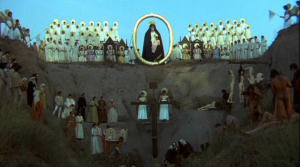
The Decameron (Pier Paolo Pasolini, 1971)
The Decameron is Pier Paolo Pasolini's first film in his Trilogy of Life, a trilogy of cinematic adaptations of classic collections of stories. Pasolini's adaptation of Boccaccio's collection of stories forgoes of the entire framing of the stories within the context of a group of men and women huddled up in a villa while the rest of Italy is dying from the plague. Instead, Pasolini merely glances upon such historical context (we get glimpses of people suddenly dying without any logical reason why, and corpses abound this film), and instead cooks up his Italian setting as forever sunny, beautiful, and green --- entirely ripe for friendliness turning into treachery, piety into debauchery, sinners into saint, love into lust, and vice versa.
The film starts with Ciappelletto (Franco Citti) bludgeoning a man inside a sack to death, and then drags the corpse and disposes it into the pit. We later learn that Ciappelletto is a hired thug who is used by usurers to force loan payments out of the people, usually with violence. His tale ends with him being sanctified by the high priest for confessing what might seem to be sins of innocence. Then there's the tale of an unfortunate young man whose riches are stolen by a beautiful swindler, and is later on trapped inside an archbishop's tomb, while trying to steal a ruby ring from the adorned corpse. In Pasolini's adaptation of Boccaccio's work, there is no permanence in fortune, or in virtue.
The film also mirrors two portraits of love, differentiated by class. The first one concerns two young lovers who finally meet in the girl's terrace, and make love, only to be discovered by the father who surprisingly acknowledges the two young lovers and blesses them, as long as the rich man marries his daughter. The second one has almost exactly the same plot, but instead of a rich man, we have a laborer who is in love with a girl of higher standing. The girl's brothers discover the laborer's love for the girl and murders him. Two similar stories of youthful romance only differentiated by social class, the results are as different as night and day. Pasolini's Marxist leanings are at work here.
Pasolini himself acts in his film, as a painter commissioned to paint the walls of a cathedral. He goes around town and discerns the faces of the townspeople, looking for inspiration for his tremendous work. In the final stages of his project, he dreams of divinity, where the Virgin Mary is in the center, with a host of angels beside her, and beneath her are the mortals forced into work and debauchery. It is curious to note that in Pasolini's next film, The Canterbury Tales (1972), he would imagine hell, and in Arabian Nights (1974), cook up both paradise and hell in Earth through magic, mysticism, and a cycle of tales. The film ends with the painter celebrating his work but finishes with a line that suggests that the process of dreaming while working is better than the final artwork.
Later on, Pasolini would disavow his Trilogy of Life as his least favorite works mainly because these are pedestrian fare, where commercial success is the result of an abundance of flesh and sex rather than artistry. I'd like to think that Pasolini disavowed the trilogy merely because the process of making them was tremendous in his part, and the success that ensued was not commensurate to his artistic processes, and the commercialization of these films turned them into moneymaking schemes instead of actual artistic products. I disagree, these films are from the first scene of a man violently bludgeoning a debtor trapped in a sack to death, to a young man being reunited with his beloved slave inside a golden palace, are all magnificent works of cinema and in their entirety, a joyful experience to behold.







.jpg)

























.jpg)




1 comment:
"The Decameron" is next to "Salo" actually my favorite film by Pasolini. Both would make an interesting double feature.
Though his next effort, "The Canterbury Tales" pales in comparison, and is probably the closest to "commercial" cinema in conventional terms, I'd still say that all of his films have enough artistry and integrity to be entirely free of such suggestions.
Too bad Pasolini didn't make more films, and the "myths" surrounding his death seem to be still better known (and more widely discussed) than his films.
Post a Comment